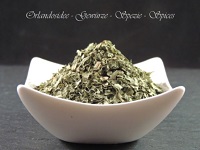
Tarragon
Artemisia dracunculus — elegant anise-licorice aroma
Tarragon is a classic European culinary herb from the Asteraceae family. Its slender leaves bring an anise/licorice-like fragrance with fresh green notes that elevate chicken, fish, eggs and creamy sauces. Dried tarragon withstands gentle heat, while its delicate top notes shine when added near the end of cooking.
- Botany: Artemisia dracunculus • Family: Asteraceae
- Parts used: leaves (dried)
- Profile: sweet anise, light herbal grassiness; clean, refined finish
- Best for: poultry, fish, eggs, cream & butter sauces, vinaigrettes, pickles
Aroma & Taste
Sweet-anise upfront with a soft herbal body and a cool, slightly peppery finish. Use sparingly—tarragon is assertive and can dominate milder flavors.
Culinary Uses
- Classics: Béarnaise and tarragon cream sauces; fines herbes; tarragon vinegar.
- Poultry & fish: fold into pan sauces; finish roast chicken, salmon or cod.
- Eggs & dairy: omelettes, scrambled eggs, quiche, compound butters.
- Vegetables: mushrooms, carrots, peas, asparagus, potatoes; great in salad dressings.
- Pickling: infuse vinegars or quick pickles for a delicate anise lift.
How to Use
- Timing: add early for background herbality; add a final pinch off-heat for bright top notes.
- Fresh ↔ dried: rule of 3 — 1 tsp dried ≈ 1 Tbsp fresh.
- Release aroma: crumble dried leaves between fingers just before adding.
Dosage & Kitchen Ratios
- Sauces/soups: 1/2–1 tsp dried per 1 l (4 cups) base; adjust to taste.
- Dressings: 1/4–1/2 tsp dried per 250 ml (1 cup) vinaigrette.
- Rubs/finishes: 1 tsp dried per 500 g (1.1 lb) protein or veg.
Pairings
Butter, cream, lemon zest/juice, Dijon mustard, shallot, chives, parsley; with chicken, turkey, white fish, shellfish, eggs; vegetables like mushrooms, peas, carrots, asparagus and potatoes.
Ingredients & Allergens
Ingredients: Tarragon leaves (Artemisia dracunculus).
Allergens: none mandatory in EN labeling for this single ingredient.
Storage & Shelf Life
Store airtight, cool, dry and away from light. Best aroma within 12–18 months. Reseal promptly after use.
Substitutes & Notes
Closest swaps: fennel fronds or a light mix of chervil + parsley. Use a smaller amount of anise seed if needed (stronger, different texture).
FAQ
Is tarragon the same as “fines herbes”?
No—fines herbes is a blend (typically parsley, chives, tarragon, chervil); tarragon is one component.
When should I add tarragon to sauces?
Near the end or off-heat to keep its delicate anise perfume vivid.
Why does fresh taste different from dried?
Drying concentrates herbality and softens the leafy freshness; balance by adding a final pinch at the end.
Merchant contact: Orlandosidee — Spice Shop (see site imprint for full company details). Email: info(at)orlandosidee.de



